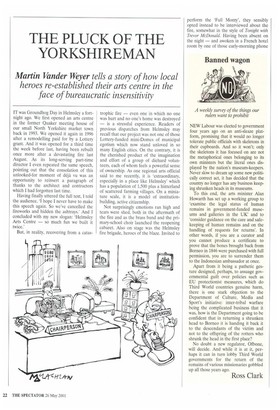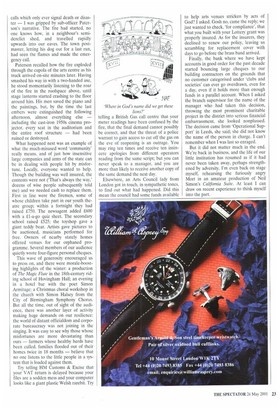THE PLUCK OF THE YORKSHIREMAN
Martin Vander Weyer tells a story of how local
heroes re-established their arts centre in the face of bureaucratic insensitivity
IT was Groundhog Day in Helmsley a fortnight ago. We first opened an arts centre in the former Quaker meeting house of our small North Yorkshire market town back in 1993. We opened it again in 1996 after a remodelling paid for by a Lottery grant. And it was opened for a third time the week before last, having been rebuilt once more after a devastating fire last August. As its long-serving part-time director I even repeated the same speech, pointing out that the consolation of this unlooked-for moment of déjà vu was an opportunity to reinsert a paragraph of thanks to the architect and contractors which I had forgotten last time.
Having finally uttered the full text, I told the audience, 'I hope I never have to make this speech again. So we've cancelled the fireworks and hidden the ashtrays.' And I concluded with my new slogan: 'Helmsley Arts Centre — so much fun we built it twice.'
But, in reality, recovering from a catas trophic fire — even one in which no one was hurt and no one's home was destroyed — is a stressful experience. Readers of previous dispatches from Helmsley may recall that our project was not one of those Lottery-funded mini-Domes of municipal egotism which now stand unloved in so many English cities. On the contrary, it is the cherished product of the imagination and effort of a group of diehard volunteers, each of whom feels a powerful sense of ownership. As one regional arts official said to me recently, it is 'extraordinary, especially in a place like Helmsley' which has a population of 1.500 plus a hinterland of scattered farming villages. On a miniature scale, it is a model of institutionbuilding, active citizenship.
Not surprisingly emotions ran high and tears were shed, both in the aftermath of the fire and as the brass band and the primary-school choir launched the reopening cabaret. Also on stage was the Helmsley fire brigade, heroes of the blaze. Invited to
perform the 'Full Monty', they sensibly opted instead to be interviewed about the fire, somewhat in the style of Tonight with Trevor McDonald. Having been absent on the night — and awoken in a French hotel room by one of those early-morning phone calls which only ever signal death or disaster — I was gripped by sub-officer Paterson's narrative. The fire had started, no one knows how, in a neighbour's semiderelict shed, and travelled rapidly upwards into our eaves. The town postmaster, letting his dog out for a last run, had seen the flames and made the emergency call.
Paterson recalled how the fire exploded through the cupola of the arts centre as his truck arrived on-site minutes later. Having smashed his way in with a two-handed axe, he stood momentarily listening to the roar of the fire in the roofspace above, until stage lanterns started crashing to the floor around him. His men saved the piano and the paintings, but, by the time the last embers were extinguished the following afternoon, almost everything else — including the cast-iron 1950s cinema projector, every seat in the auditorium and the entire roof structure — had been ruined or destroyed.
What happened next was an example of what the much-misused word 'community' really means, and of just how insensitive large companies and arms of the state can be in dealing with people hit by misfortune. Locally, everyone wanted to help. Though the building was well insured, the contents were not (`That's always the way,' dozens of wise people subsequently told me) and we needed cash to replace them. First in line were the firemen, some of whose children take part in our youth theatre group; within a fortnight they had raised £750. The newsagent added £600 with a f1-a-go quiz sheet. The secondary school raised £525; the toyshop gave a giant teddy bear. Artists gave pictures to be auctioned, musicians performed for free. Owners of nearby stately homes offered venues for our orphaned programme. Several members of our audience quietly wrote four-figure personal cheques.
This wave of generosity encouraged us to press on, and there were morale-boosting highlights of the winter: a production of The Magic Flute in the 18th-century riding school of Hovingham Hall; an evening in a hotel bar with the poet Simon Armitage; a Christmas choral workshop in the church with Simon Halsey from the City of Birmingham Symphony Chorus. But all the time, out of sight of the audience, there was another layer of activity making huge demands on our resilience: the world of distant officialdom and corporate bureaucracy was not joining in the singing. It was easy to see why those whose misfortunes are more devastating than ours — farmers whose healthy herds have been culled, families flooded out of their homes twice in 18 months — believe that no one listens to the little people in a system that is loaded against them.
Try telling HM Customs & Excise that your VAT return is delayed because your files are a sodden mess and your computer looks like a giant plastic Welsh rarebit. Try
telling a British Gas call centre that your meter readings have been confused by the fire, that the final demand cannot possibly be correct, and that the threat of a police warrant to gain access to cut off the gas on the eve of reopening is an outrage. You may ring ten times and receive ten insincere apologies from different operators reading from the same script; but you can never speak to a manager, and you are more than likely to receive another copy of the same demand the next day.
Elsewhere, an Arts Council lady from London got in touch, in sympathetic tones, to find out what had happened. Did this mean the council had some funds available to help arts venues stricken by acts of God? I asked. Gosh no, came the reply; we just wanted to check, 'for compliance', that what you built with your Lottery grant was properly insured. As for the insurers, they declined to renew our policy, leaving us scrambling for replacement cover with days to go before the brass band arrived.
Finally, the bank where we have kept accounts in good order for the past decade started bouncing large cheques to our building contractors on the grounds that no customer categorised under 'clubs and societies' can ever go overdrawn, even for a day, even if it holds more than enough funds in a parallel account. When I asked the branch supervisor for the name of the manager who had taken this decision, throwing the most prominent charitable project in the district into serious financial embarrassment, she looked nonplussed. The decision came from 'Operational Support' in Leeds, she said; she did not know the name of the person in charge. I can't remember when I was last so enraged.
But it did not matter much in the end. We're back in business, and the life of our little institution has resumed as if it had never been taken away, perhaps strengthened by adversity. I'm even back on stage myself, rehearsing the furiously angry Mort in an amateur production of Neil Simon's California Suite. At least I can draw on recent experience to think myself into the part.



















































































 Previous page
Previous page